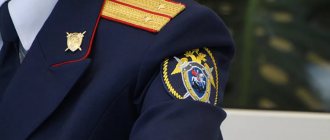Who is an Investigator
An investigator in criminal procedural law is an official authorized to carry out a preliminary investigation in a criminal case, as well as other powers provided for by criminal procedural legislation; in accordance with the Code of Criminal Procedure of the Russian Federation, he is a party to the prosecution.
The official evaluates the evidence according to his inner conviction, based on the totality of evidence available in the criminal case, guided by the law and conscience (Part 1 of Article 17 of the Code of Criminal Procedure). He collects evidence, checks it and evaluates it from the standpoint of legality of receipt, reliability, sufficiency, relevance, and then admissibility.
The future investigator must receive a Higher Legal Education , since while carrying out his activities he must know:
- code of Criminal Procedure,
- forensics,
- legislation,
- logic,
- psychology.
After graduating from such a higher educational institution, it is quite possible to get an internship in the investigative department. Your future career depends on successful completion of your internship. If everything goes smoothly, you will be able to get a good job immediately after practice.
However, even after graduation, the learning process itself does not end. Investigators have to take three courses annually:
- hand-to-hand combat;
- shooting from service (personal) weapons;
- physical training.
But getting a higher education is not the only path to working as an investigator. The second option for achieving this goal is to join the investigative bodies of the Ministry of Internal Affairs with secondary education. Of course, in this case you can only apply for the less desirable position of assistant investigator. However, the situation can be corrected by completing (even if in absentia) at least three university courses in your specialty.
In general, the career ladder looks like this:
- Assistant investigator.
- Investigator.
- Senior investigator.
- Investigator for particularly important cases.
- Head of the investigation department.
Only an erudite person who has:
- analytical mind and flexibility of thinking,
- able to express his thoughts clearly and concisely,
- defend your point of view and give reasons for it.
This is the kind of person who can achieve a lot in this profession.
Currently, you can get the desired position only by obtaining a higher legal education. Therefore, the first step will be preparation for admission and more.
Historical background of the profession
The profession dates back to the Roman Empire. Already at that time, the state needed people who would carry out secret search activities. After collecting all the necessary facts and systematizing them, they presented the data obtained at the court hearing.
Only at the end of the 19th century did criminology become an independent science. Its founders are usually called the Frenchman Alphonse Bertillon and the Austrian Hans Gross. They proposed identification methods using fingerprints and a person’s portrait.
How the “discretionary powers” of the investigator violate the principles of adversarialism and equality of arms
Criminal proceedings within the meaning of Art. 6 of the Code of Criminal Procedure of the Russian Federation is intended to protect the rights and legitimate interests of individuals and organizations who have suffered from crimes, as well as to protect the individual from illegal and unfounded accusations, convictions, and restrictions on his rights and freedoms. Criminal prosecution and the imposition of a fair punishment on the guilty person correspond to the purpose of criminal proceedings to the same extent as the refusal to prosecute the innocent, releasing them from punishment, and the rehabilitation of everyone who was unreasonably subjected to it.
The adversarial principle of the parties is one of the fundamental principles of criminal proceedings and is enshrined in Art. 15 Code of Criminal Procedure of the Russian Federation. The functions of prosecution, defense and resolution of a criminal case are separated from each other and cannot be assigned to the same body or official. The court is not a criminal prosecution body, does not act on the side of the prosecution or defense, but is obliged to create conditions for the parties to exercise the rights granted to them and to fulfill procedural duties. The prosecution and defense have equal rights before the court.
According to Art. 16 of the Code of Criminal Procedure of the Russian Federation, the suspect (accused) is guaranteed the right to defense. The court, prosecutor, investigator and inquiry officer are obliged to explain to the specified person his rights and ensure the opportunity to defend himself by all means and methods not prohibited by criminal procedural legislation.
The listed provisions of the general norms of the Code of Criminal Procedure of the Russian Federation are consistent in meaning with the Constitution of the Russian Federation. From the Determination of the Constitutional Court of the Russian Federation of November 4, 2004 No. 430-O, it follows that, according to Part 3 of Art. 123 of the Constitution of the Russian Federation, legal proceedings are carried out on the basis of adversarialism and equality of the parties, which involves providing the parties to the prosecution and defense with equal procedural opportunities to defend their rights and legitimate interests. As the Constitutional Court of the Russian Federation has repeatedly pointed out, a guarantee of judicial protection and a fair trial is the real opportunity provided to the parties to bring their position regarding all aspects of the case to court, since only under this condition is the right to defense realized in a court hearing, which must be fair, complete and effective.
Thus, the “end product” of criminal proceedings is a fair, high-quality final decision based on factual data and the correct application of the law. The factual data on the basis of which it is adopted must be collected taking into account the equality of the parties (subject to the possibility of defending oneself by all methods and means not prohibited by the Criminal Procedure Code of the Russian Federation) and on the basis of the real opportunity provided to the parties to bring their position to court.
However, in practice this is not always the case, and one of the reasons for poor-quality court decisions in criminal proceedings, despite the proclamation of the principles of equality and competition between the parties, as well as the right to “real defense”, is the preponderance of powers in favor of the prosecution at the stage of preliminary investigation .
Recently, in my practice, I came across a conviction against two entrepreneurs who committed a crime in the field of economic activity. Having read the text of the verdict, I noticed that it was based mainly on the confessional testimony of one of the convicts, who was not chosen as a preventive measure in the form of detention at the stage of the preliminary investigation and was subsequently assigned a relatively “mild” punishment. The second convict did not admit guilt, tried to defend himself, and ultimately received a severe punishment, and spent the investigation in custody. The verdict was also based on the testimony of one of the victims, given in the course of the preliminary investigation, and indirect witnesses, read out in court.
In addition, at the investigation stage, the accused, who did not plead guilty, in support of his arguments, petitioned for the appointment of a judicial financial and economic examination, and also insisted on holding confrontations with persons who, as he believed, had incriminated him. Despite common sense, the need to establish objective circumstances in the case, work out all versions, exercise the right to defense in all not prohibited ways, use special knowledge, as well as existing contradictions in testimony, the petitions were denied.
Thus, the investigator acted in the interests of the prosecution, and not in establishing the objective truth of the case. Obviously, de facto the right to defense was violated, which undoubtedly could have affected the quality of the final decision in the case, but de jure the investigator acted within the framework of the so-called “discretionary” powers granted to him by law.
The term “discretionary” is borrowed from the French language – “discretionnaire”, meaning “depending on personal discretion”.
The use of discretionary powers by the investigator is predetermined by the legislator in different ways and from the point of view of legal technique. In some cases, the law directly provides for the investigator's ability to choose his behavior. This is indicated, in particular, by the phrases “at the discretion of the investigator” (Part 1 of Article 191 of the Code of Criminal Procedure of the Russian Federation), “if necessary” (Part 1 of Article 152, Part 7 of Article 162 of the Code of Criminal Procedure of the Russian Federation), etc.
In other situations, the possibility of using discretionary powers is determined by such formulations as “the investigator has the right” (for example, Article 25, Part 1 of Article 28, Part 1 of Article 91, Part 1 of Article 97, Article 181, Part 1 Article 427 of the Code of Criminal Procedure of the Russian Federation, etc.), “the investigator can” (Part 1 of Article 193 of the Code of Criminal Procedure of the Russian Federation). Thus, “the investigator has the right to conduct a confrontation” if there are significant contradictions in the testimony (Article 192 of the Code of Criminal Procedure of the Russian Federation).
In addition, the investigator has the right not to conduct a confrontation, even if it is objectively necessary to establish the circumstances of the case, and if it is carried out, he has the right to withdraw defense issues at his own discretion, using the same discretionary powers1.
In the legal literature, the term “discretionary powers of the investigator” is absent, but there is a definition of the concepts that make up it or are related. For example, L.V. Golovko believes that the discretionary principle is nothing more than a universal procedural technique from the traditional arsenal of legal techniques, which consists in the fact that the legislator gives the law enforcement officer the right to act in a certain situation at his own discretion, based on the circumstances of the case2.
In my opinion, some of the discretionary powers that the prosecution has at the preliminary investigation stage (enshrined in the Code of Criminal Procedure of the Russian Federation) contradict the fundamental principles of criminal proceedings set out in Art. 6, 15 and 16 of the Code of Criminal Procedure of the Russian Federation, namely, the principles of equality and competition of the parties, as well as ensuring the right to defense.
This can lead to miscarriages of justice. To minimize them and guarantee compliance with the basic principles of criminal proceedings, it is necessary to eliminate the specified conflict of norms by bringing the provisions of all articles of the Code into conformity with the basic principles of criminal proceedings set out in Part I, Section. Chapter I 2 – Art. 6, 15, 16.
In my opinion, not all discretionary powers vested in the investigator affect the quality of the final decision in the case and contradict the principles set out in Art. 6 Code of Criminal Procedure of the Russian Federation. So, from Art. 152 “Place of the preliminary investigation” it follows that the preliminary investigation is conducted at the place where the act containing signs of a crime was committed. However, if it is necessary to carry out investigative or search actions in another place, the investigator has the right to carry them out personally or entrust them to another investigator or investigative body. The investigator, in turn, also has the right to personally carry them out or entrust them to another investigator or investigative body.
It is obvious that taking into account the conscientious and professional performance by each law enforcement officer of his duties and the fulfillment of legally accepted instructions, as well as for a high-quality final decision in the case, it does not matter which specific officer carried out the investigative actions. That is, not all rules of law providing for the discretionary powers of the investigator create an imbalance in the equality of the parties in the process and affect the quality of the decision in a criminal case.
Let us consider the norms of the Code of Criminal Procedure of the Russian Federation establishing the discretionary powers of the investigator, which affect the quality of the final decision in the case, and also impede the exercise of the right to defense, create an imbalance of equality of the parties and do not meet the principle of adversarialism.
In particular, Art. 191 states that when conducting an interrogation, confrontation, identification and verification of testimony with the participation of a minor victim or witness who has not reached 16 years of age or has reached this age but suffers from a mental disorder or is lagging in mental development, the participation of a teacher or psychologist is mandatory. At the same time, when carrying out these actions with the participation of a minor who has reached 16 years of age, a teacher or psychologist is invited at the discretion of the investigator.
In accordance with Art. 181 of the Code of Criminal Procedure of the Russian Federation, in order to verify and clarify data relevant to the case, the investigator has the right to conduct an investigative experiment by reproducing actions, as well as the situation or other circumstances of a specific event. At the same time, the possibility of perceiving any facts, performing certain actions, the occurrence of any event is checked, and the sequence of the event and the mechanism for the formation of traces are identified. It follows from this: if a request to conduct an investigative experiment to confirm or refute any circumstances relevant to the consideration of the case is submitted by the defense, the investigator has the right to refuse to satisfy it.
According to Art. 427 of the Code of Criminal Procedure of the Russian Federation, if during the preliminary investigation of a case of a crime of minor or medium gravity it is established that the correction of a minor accused can be achieved without the use of punishment, the investigator, with the consent of the head of the investigative body, as well as the investigator with the consent of the prosecutor, has the right to make a decision to terminate the criminal prosecution and petition before the court on the application of a compulsory educational measure to the accused, provided for in Part 2 of Art. 90 of the Criminal Code of the Russian Federation.
Thus, in two completely identical cases (“twin cases,” as they are often called by practicing lawyers), radically different decisions can be made that affect the future fate of the accused, depending on the discretion of the investigator.
Lawyers most often point to Art. 192, 195, 198 of the Code of Criminal Procedure of the Russian Federation as norms that most significantly violate the principle of equality of parties and the right to defense. So, from the text of Art. 192, which regulates the grounds for appointment and the procedure for conducting a confrontation, it follows: if there are significant contradictions in the testimony of previously interrogated persons, the investigator has the right to conduct a confrontation.
Accordingly, if the defense receives a request to conduct a confrontation with a person whose testimony contains significant contradictions with the defendant’s testimony, or the said person clearly incriminates the suspect (accused), the investigator also has the right to refuse to satisfy the request.
According to Art. 195 of the Code of Criminal Procedure of the Russian Federation, having recognized the need to order a forensic examination, the investigator issues an appropriate resolution or petition. It should be noted that the mandatory appointment of a forensic examination is provided for in Art. 196 of the Code of Criminal Procedure of the Russian Federation, if it is necessary to establish:
- cause of death;
- the nature and degree of harm caused to health;
- the mental or physical state of the suspect (accused), when doubt arises about his sanity or ability to independently defend his rights and legitimate interests in criminal proceedings;
- the mental state of a person over 18 years of age accused of committing a crime against the sexual integrity of a minor under 14 years of age, to resolve the issue of the presence or absence of a disorder of sexual preference (pedophilia);
- the mental or physical state of the suspect, accused, when there is reason to believe that he is a drug addict;
- the mental or physical state of the victim, when doubt arises about his ability to adequately perceive the circumstances relevant to the case and testify;
- the age of the suspect (accused, victim), when this is important for the case, and supporting documents are missing or are in doubt.
In all other cases, to establish other circumstances, a forensic examination is appointed at the discretion of the investigator.
Let us consider from the point of view of the discretionary powers of the investigator Art. 198 of the Code of Criminal Procedure of the Russian Federation, which regulates the rights of the suspect, accused, victim, witness in the appointment and conduct of a forensic examination. In my opinion, the most unprotected rights here are those provided for in paragraphs 3–5 of Part 1 of this norm, namely: the right to apply for the involvement as experts of persons indicated by the suspect (accused, victim, witness) or for an examination to be carried out in a specific expert institution ; the right to petition for the inclusion of additional questions for the expert in the resolution on the appointment of a forensic examination; be present with the permission of the investigator during the examination, give explanations to the expert. This is due to the fact that the final implementation of these rights of the suspect, accused, victim, witness depends entirely on the personal discretion, permission or prohibition of the investigator.
Thus, I believe it is necessary to amend the Code of Criminal Procedure of the Russian Federation, bringing all the rules regulating the discretionary powers of the investigator at the stage of preliminary investigation in accordance with the purpose of criminal proceedings and its basic principles.
For example, Part 1 of Art. 192 of the Code must be brought into compliance with Art. 6, 15 and 16 of the Code of Criminal Procedure of the Russian Federation, so that this norm contains the grounds for conducting a confrontation on the initiative of the defense. In particular, introduce an instruction to conduct a confrontation not only at the discretion of the investigator, but also when there are significant contradictions in the testimony of previously interrogated persons, and (or) the person testifies against the accused or suspect.
The norm of Part 1 of Art. 196 of the Code should be supplemented with provisions stating that the appointment and conduct of an examination is mandatory in the investigation of crimes in the economic sphere, if the suspect (accused) requests this, and if, to establish the circumstances provided for in Art. 73 of the Code, special knowledge is required.
Finally, in paragraph 5 of part 1 of Art. 198 of the Code of Criminal Procedure of the Russian Federation, it is advisable to indicate that additional questions may be included in the resolution on the appointment of a forensic examination at the request of the defense party. In addition, give the suspect (accused), as well as his representative, the right to give explanations to the expert, as well as to be present during the research.
The other day, at the Center for Public Procedures “Business against Corruption” under the Commissioner under the President of the Russian Federation for the Protection of the Rights of Entrepreneurs, a round table was held on the topic “Discretionary powers of the investigator at the stage of preliminary investigation and the principle of equality of parties”, as a result of which it was decided to create a working group on developing proposals for changes to legislation in order to comply with the basic principles of criminal proceedings.
In conclusion, I note that, in my opinion, some of the discretionary powers of the investigator at the preliminary investigation stage not only run counter to the basic principles of criminal proceedings, but under certain circumstances can also create fertile ground for abuse and corruption.
1 Tolkushkin A.V. Encyclopedia of Russian and international taxation // Lawyer. 2003.
2 Golovko L.V. New Code of Criminal Procedure of the Russian Federation in the context of comparative criminal procedure law // State and Law. 2002. No. 5.
Features of the investigator's profession
The work of an investigator is an activity aimed at solving crimes. The peculiarity of his work begins with the inspection of the crime scene, identification and collection of all necessary evidence. And subsequently, after obtaining the necessary laboratory results and conclusions, determining the essential details that will go into the process of solving the crime and identifying the offender. The exact identification of the latter also depends on the level of qualifications, professional qualities and experience of the investigator.
What you should know
- Federal laws and federal constitutional laws.
- Various legal acts of the Russian Federation, one way or another related to the professional activities of the investigator.
- Regulatory legal acts of your department of the investigative committee.
- Decrees and regulations related to human rights, as well as the functions and responsibilities of the investigator, issued by the Constitutional Court of the Russian Federation, as well as the Supreme and Supreme Arbitration Courts.
A competent specialist must also have an understanding of the rulings of the European Court of Human Rights (only if these rulings are in one way or another related to the activities of the investigator and criminal law).
- Fundamentals of customs legislation.
- Directions, orders and other normative acts of the RF IC.
- Fundamentals of ethics and official behavior of employees in the RF IC.
- Basics of business communication. Inner order rules.
- Safety Basics.
- The procedure and rules for working with statistics and various kinds of documents.
See Who is an interrogator.
What is the job of an investigator?
More local and narrowly focused tasks of the investigator’s activities include the following:
- Carrying out preliminary investigation of the case assigned to him.
- Processing of incoming information, its analysis, collection and synthesis of available information, resolution of tactical problems arising during the investigation.
- Solving crimes of various specifics, which include not only criminal, but also economic and political offenses.
- Management of the task force, including investigators, coordinating its actions.
- Organizing interaction with the criminal police service in order to detain suspects.
- Establishing the truth.
- Transfer of all information obtained during the investigation to the court in order to impose a fair sentence on the accused person.
The Code of Criminal Procedure of the Russian Federation distinguishes two types of investigators
Investigator - criminologist - an official authorized to carry out a preliminary investigation in a criminal case, as well as to participate, on behalf of the head of the investigative body, in the production of certain investigative and other procedural actions or to carry out certain investigative and other procedural actions without accepting the criminal case for his proceedings (clause 40.1 Article 5 of the Code of Criminal Procedure of the Russian Federation). In addition, a forensic investigator, on behalf of the head of an investigative agency, has the right to carry out individual investigative and other procedural actions in a criminal case being processed by another investigator without accepting the criminal case for his own proceedings. The order of the head of the investigative body must be given in writing;
Investigator - an official authorized to carry out a preliminary investigation in a criminal case, as well as other powers provided for by this Code (clause 41 of Article 5 of the Code of Criminal Procedure of the Russian Federation);
The employee's activities include:
- initiation of criminal cases;
- resolving all issues arising during the investigation and taking the necessary measures.
- active participation in trials of the accused;
- appealing certain decisions and achieving a fair outcome in court cases.
As for the personal side of the investigator, he needs to have an analytical mind and be able to defend his opinion by citing reliable facts and evidence.
Sample job description for an investigator of the Ministry of Internal Affairs
General provisions
- An investigator of the Ministry of Internal Affairs is hired in accordance with the established procedure, by order of the head of the relevant department.
- The investigator of the Ministry of Internal Affairs reports to the head of the investigative unit.
- An investigator of the Ministry of Internal Affairs undergoes regular re-certification in the manner prescribed in the relevant documentation.
- The work schedule of an investigator of the Ministry of Internal Affairs is determined on the basis of internal documents of the unit.
- A person applying for this position must meet the following requirements:
- legal education;
- successfully passed the medical examination and professional selection;
- availability of a set of necessary documents.
- The procedure for replacing an investigator in the event of his absence (illness, business trip, etc.) is determined by the head of the investigative unit based on current regulations.
- The investigator of the Ministry of Internal Affairs is obliged to understand the following issues:
- current legal framework governing investigative activities;
- principles of interaction with other representatives of law enforcement agencies;
- the order of subordination and hierarchy of the relevant units;
- principles of maintaining the necessary document flow;
- theoretical foundations of criminology, criminology, jurisprudence;
- methods of working with witnesses, victims, suspects and other persons;
- principles of classification of various types of illegal actions;
- methods of applying advanced achievements of criminology;
- parameters for using relevant technology and equipment;
- algorithms for investigating illegal actions;
- principles of examination and processing of the results obtained;
- rules for conducting an inspection of the scene of an incident;
- principles of working with photographic images;
- rules for documenting the results obtained;
- norms and tactics of interrogation;
- algorithms for conducting investigative actions, the need for which was identified during investigations;
- standards of ethics for law enforcement officials;
- rules for working with office equipment and specialized software;
- labor discipline standards, labor protection and fire safety rules.
- The investigator of the Ministry of Internal Affairs is guided by:
- the current regulatory framework;
- relevant documentation of the Ministry of Internal Affairs;
- internal documentation of the department;
- the contents of this manual.
Responsibilities
The investigator of the Ministry of Internal Affairs is assigned the following functions:
- Interaction with other law enforcement officials on issues of their professional activities.
- Ensuring the safety of data obtained during the investigation.
- Planning and carrying out the necessary investigative activities.
- Detection of motives and circumstances significant for the investigation of offenses.
- Issuing instructions for conducting examinations and other investigative actions.
- Preparation and submission of requests to the appropriate authorities, within their competence.
- Drawing up protocols, plans, diagrams and other investigative documents.
- Taking measures to identify those responsible for criminal acts.
- Conducting interviews with witnesses and victims and examining the scene of the incident.
- Formation of the evidence base necessary to bring charges.
- Referral of cases for filing charges.
- Resumption of the investigation when new significant circumstances are identified.
- Closing cases if there are sufficient grounds for this.
- Ensuring the rights guaranteed by current legislation to persons participating in a criminal investigation.
- Participation in the activities of investigative groups, within the boundaries of established responsibility.
- Ensuring the maintenance and preservation of necessary documentation.
- Compliance with labor discipline standards and fire safety rules.
Responsibility
The investigator of the Ministry of Internal Affairs is responsible in the following situations:
- For disclosure of confidential information - in the manner prescribed in the articles of the relevant legislation.
- For failure to fulfill their professional functions - within the limits given in the documentation of the Ministry of Internal Affairs and relevant legal acts.
- For violations of regulations and legislative acts - in accordance with the provisions of administrative, labor, and criminal law.
- In other cases provided for by the rules of the Ministry of Internal Affairs and current legislation.
Rights
An investigator of the Ministry of Internal Affairs has the following set of rights:
- Sign documents within your competence.
- Initiate cases in the order specified in the provisions of the Code of Criminal Procedure.
- Accept criminal cases for production and transfer in accordance with the established procedure.
- Direct investigations into pending cases.
- Carry out the necessary investigative actions within the boundaries determined by the Code of Criminal Procedure.
- Obtain court decisions and necessary consents from the heads of relevant departments.
- Give instructions to the inquiry authorities to carry out investigative measures necessary for the investigation.
- In accordance with the established procedure, appeal the actions of the prosecutor's office to cancel decisions to initiate criminal cases.
- Apply other rights specified in the Code of Criminal Procedure and relevant legislation.
The preliminary investigation is carried out by investigators
Investigative Committee under the Prosecutor's Office of the Russian Federation, investigators from the federal security service, investigators from internal affairs agencies, as well as investigators from agencies for control of the circulation of narcotic drugs and psychotropic substances. Regardless of departmental affiliation, all investigators are endowed with equal procedural rights and perform the same duties. At the same time, their competence in relation to the investigation of certain criminal cases (investigation jurisdiction) is delimited by law and is determined taking into account the specifics of the subject of the investigation, reflected in the criminal legal classification of the relevant acts (Article 151 of the Code of Criminal Procedure).
Functions of the investigator as a participant in criminal proceedings
Note 1
The investigator is one of the most significant participants in pre-trial proceedings, carrying out the preliminary investigation. His actions and decisions control the course of the preliminary investigation and the further development of the case (clause 3, part 2, article 38 of the Code of Criminal Procedure of the Russian Federation). The investigator is engaged in collecting and examining all the necessary evidence (incriminating and exculpatory) and checking all versions (accusation and defense).
An investigator is an unbiased, disinterested participant in legal proceedings, objectively and impartially examining all the circumstances of the case, collecting evidence in order to understand the case, in all its circumstances, and give them a correct assessment. The result of the investigation is a conclusion that gives grounds to either send the case to the prosecutor and then to the court, or terminate it, or suspend it.
Are you an expert in this subject area? We invite you to become the author of the Directory Working Conditions
In accordance with the Criminal Procedure Code, we have already completed course work
Criminal procedural law in more detail, investigators of the Investigative Committee of the Russian Federation On this topic, we have already completed
a report on practice.
Practice in the Investigative Committee of the Russian Federation is entrusted with the investigation of dangerous and serious crimes in more detail, while a significant number of investigators are concentrated in the investigative bodies of the Ministry of Internal Affairs of the Russian Federation. On this topic, we have already completed
abstract
Ministry of Internal Affairs of the Russian Federation in more detail, which investigate most crimes. Investigators are part of the FSB bodies, bodies for control of the circulation of psychotropic substances, narcotic drugs, they investigate cases within their competence. According to Art. 38 of the Code of Criminal Procedure, all investigators have the same procedural powers and procedural independence to carry out the prosecution function, regardless of departmental affiliation.
Finished works on a similar topic
Course work Investigator as a participant in criminal proceedings 470 ₽ Abstract Investigator as a participant in criminal proceedings 240 ₽ Test work Investigator as a participant in criminal proceedings 200 ₽
Receive completed work or specialist advice on your educational project Find out the cost







